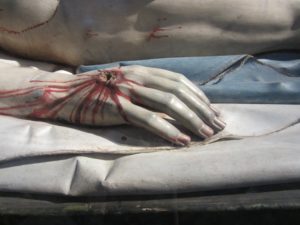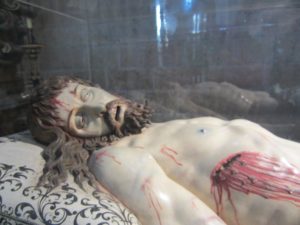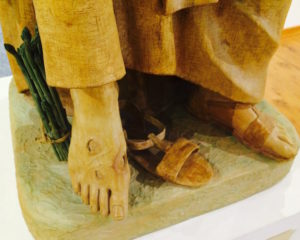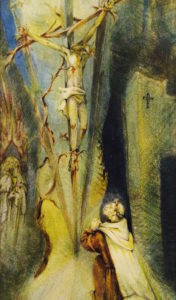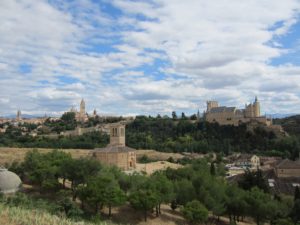
Prayer of a Soul Taken With Love – by St. John of the Cross
Mine are the heavens and mine is the earth. Mine are the nations, the just are mine, and mine the sinners. The angels are mine, and the Mother of God, and all things are mine; and God Himself is mine and for me, because Christ is mine and all for me.What do you ask, then, and seek, my soul? Yours is all of this, and all is for you.
When Saint John starts to write, he has already reached divine union. With the summit in mind, the synthesis that stands at the center of his whole doctrine is Christ crucified, the slain lamb. Our literature says that we must love the cross, but the point is that it’s not necessarily the love of the cross, but the love of Christ on the cross; this understanding can help keep our faith lives in perspective.
Sister Ruth Burrows, a Carmelite nun, writes, “The cross is the mysterious design of God for our glorification.” That again harkens back to the reality of our weaknesses. “We must not identify [the cross] with pain as such. Its significance lies, not in the physical and mental torment of Him who hung upon it, but in His obedience, His passionate surrender to God, and it is these we must make our own.”
When we live for love, for all that is most valuable, we cannot be afraid to be vulnerable. That’s something that is common to the whole human experience. Our call to be united with Christ, the fullness of love, takes on a whole new depth of meaning. Even in human relationships—that’s true. When we’re called to live and to love what is most valuable, we cannot be afraid to be vulnerable; we cannot be afraid to be stripped of all for the sake of All. If we are not willing to embrace His vulnerability in faith, we will not be able to enjoy the full victory of love. In this context, we can begin to better understand why Saint John is as tenacious in his ascetical theology as he is tender in his mystical theology. The two, of course, are as inseparable as the cross is from the resurrection.
Nada is Saint John’s code word. Nada is the theological shorthand which summarizes the whole of Saint John’s doctrine, his spiritual ascetism which speaks of the discipline necessary for seeking the perfection of charity. Charity cannot be made perfect, love cannot be made perfect without discipline. We cannot grow in the agape of Almighty God without first being purified by that same love. In very practical terms of spirituality, nada is to strive after nothing other than the perfect fulfillment of the law of God and the carrying of Christ’s cross.
Let’s try and sink deeply into truth of what Saint John of the Cross means by nada. Ascetism involves depriving one’s desires of certain delights but this is not supposed to be contrived, cold, mechanical, soulless or inhuman. After all, in Saint John himself, we see sensibility, affection, human tenderness and spontaneous love.
As Father Thomas Dubay says in Fire Within, “We are to find delight in everything but cling to it in nothing.” Here’s the tricky thing. In order to actually do that, certain changes have to take place. If I’m taking delight in everything, I could subconsciously cling to it in everything. I might not even be aware that I’m clinging to the fact that I delight in it; I don’t become aware of that attachment until it’s taken away from me. It’s so easy, especially with poverty. Our spiritual life involves a tough battle. We need to have clearly defined norms, but sometimes, those norms could be so detailed and superficial that they can begin to become an end in itself. We have to be careful not to become pharisaical, but we do need the law and we do need clearly defined terms of the law. But without the law, and if we only have the ‘spirit of poverty,’ we can so easily deceive ourselves.
I could say, ‘Well, what matters is not the fact that I own all this. Jesus didn’t condemn riches in and of itself, but just the love of money. I can have all of this, but it doesn’t mean that I’m attached to it.’ That’s true, but how do you know that you’re not attached? Somebody could have all these possessions in their home and say, ‘It all serves a different purpose. This reminds me of a memory. This is for that. This is in case of a disaster. I have all these precautions, all these resources at my disposal and they’re all for practical purposes. I really don’t need them. I really don’t care about any of them.’
And hopefully you don’t, but when something is asked of us to be sacrificed, we really come to discover what is in the depths of our will. Then you see where your heart is, where your treasure is, and there your heart will be, as the Lord says. We need to “find delight in everything but cling to it in nothing”(to be continued).
Copyright 2016, Fr. Robert Barcelos. All Rights Reserved
Novena Prayer to St. John of the Cross
Lord, you endowed our Father, St. John of the Cross with a spirit of self-denial and a love of the cross. By following his example may we come to the eternal vision of your glory. Through his intercession, may we obtain the favor we ask for (pause for intention) if it be for our good and the greater glory of God. We ask this through Christ our Lord. Amen.
The Litany of Humility
O Jesus! meek and humble of heart, Hear me.
From the desire of being esteemed, Deliver me, Jesus.
From the desire of being loved…
From the desire of being extolled …
From the desire of being honored …
From the desire of being praised …
From the desire of being preferred to others…
From the desire of being consulted …
From the desire of being approved …
From the fear of being humiliated …
From the fear of being despised…
From the fear of suffering rebukes …
From the fear of being calumniated …
From the fear of being forgotten …
From the fear of being ridiculed …
From the fear of being wronged …
From the fear of being suspected …
That others may be loved more than I, Jesus, grant me the grace to desire it.
That others may be esteemed more than I …
That, in the opinion of the world,
others may increase and I may decrease …
That others may be chosen and I set aside …
That others may be praised and I unnoticed …
That others may be preferred to me in everything…
That others may become holier than I, provided that I may become as holy as I should…


